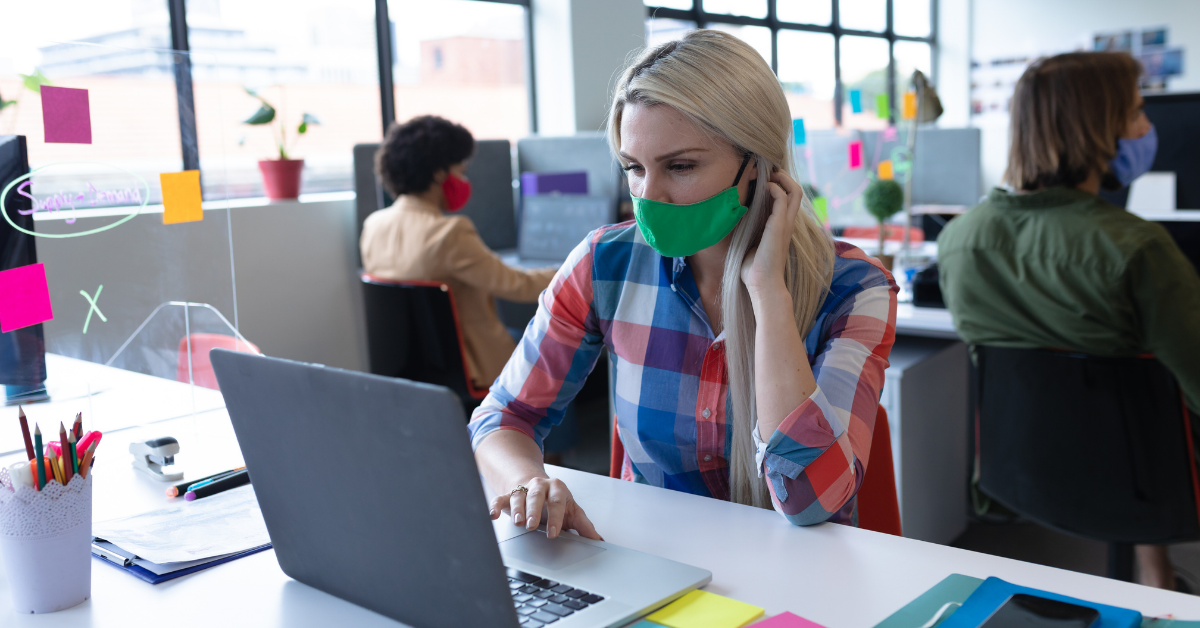
Ready for in-person meetings, water cooler talks and lunch breaks with colleagues? Here are five tips to help you feel safer when returning to the office.
Our return to a new normal is in full motion. The first half of 2021 was filled with COVID vaccines, going mask-free outside, a decline in infection rates and new CDC guidance. All of this has many employers ready to bring workers back to their desks. But with herd immunity still out of reach and news about the delta variant, there are concerns about when and where to wear masks and how to enforce social distancing in the office.
Dr. Jennifer Womack, an internal medicine physician at Tryon Medical Partners Uptown, recommends that people take precautions and practice proper hygiene when getting back to work with colleagues. If you’re headed to your desk again, remember these five tips from the doctors at Tryon Medical Partners.
1. Get vaccinated
Tryon physicians are strongly recommending people get vaccinated wherever and however they can. Being fully vaccinated is the best way to protect yourself and others while reducing the spread of COVID-19. If you are high-risk or have a vulnerable family member at home, it’s a good time to talk with your physician about the vaccines and if you need a recommendation for extended remote work options.
“Some employers are requiring workers to get vaccinated against COVID-19 before returning to in-person work,” Dr. Womack says. “It’s important to know your company’s policy and how it affects you. If all employees are vaccinated, this might mean that your employer can ease up on some safety measures like allowing a fully vaccinated group to have an unmasked meeting.”
2. Wear a face mask
The CDC recommends that unvaccinated people wear masks in indoor public settings. Even for those who are vaccinated, masks are still required in some settings like doctor’s offices and airports. In addition, some office spaces are open concept with no physical boundaries, so Dr. Womck recommends continuing to wear a face mask, keep six feet of distance when possible and wash your hands often.
“If you have a personal office with a door, you can safely take off your mask while working at your desk,” Dr. Womack says. “But if you’re meeting with coworkers, it’s a good idea to put your face mask back on.”
3. Know your employer’s cleaning plan
Employers have been working on plans for cleaning and sanitizing office spaces in anticipation of this return. It’s important to understand their policy and how they will maintain sanitization of the break room, kitchen, shared workstations and restrooms.
“I’m recommending that people toss an extra pack of sanitizing wipes into their work bag,” Dr. Womack says. “It’s important to wipe down those shared workspaces and high-touch surfaces, like the computer keyboard and mouse, before settling in.”
4. Understand the company travel policy
Most employers have created COVID-related travel policies that limit domestic and international travel. Even though the CDC says fully vaccinated people are permitted to travel, it’s best to double check the details before you lock in that out-of-office message.
If you do travel, plan to follow local guidance and the CDC’s requirements and recommendations.
“Be mindful of where and how you vacation,” Dr. Womack says. “A drive to a beach house is very different from a trip to Las Vegas. It would be a good idea to work remotely right after vacation to avoid transmitting the virus to coworkers should symptoms appear.”
5. If you have symptoms, get tested
If you start to experience symptoms, get tested and if results are positive for COVID-19, stay at home and away from others for the recommended 10-day time frame. If you’re unsure about your symptoms, talk with your trusted physician, who will recommend the best testing method and closest testing site.
As return to work unfolds, we should remember to practice patience and understanding. Lifestyles vary, and we don’t know who’s fully vaccinated or has a vulnerable family member at home. We must remain cautious and continue to practice safety measures in public settings for everyone’s benefit. If you have concerns about returning to work, contact your Tryon doctor for an appointment either in person or virtually.

